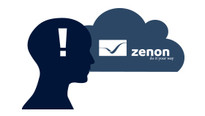What you always wanted to know about cloud computing
Cloud computing raises many questions and is often looked at with distrust and skepticism, particularly in industrial companies: How can we benefit from this deployment model? Is our data really secure? This Q&A will give you the answers.
For which deployment and application scenarios can industrial companies make use of cloud computing?
In industrial environments cloud computing is primarily suited to data-intensive applications and vertical data integration. All production and operating data of individual production lines, factories and sites is aggregated, sent to the cloud and can be evaluated and compared there optimally. Applications for this range from company-wide dashboards and benchmarks of machines and production data, through energy data management, to predictive analytics.
What benefit is there for industrial companies if they use cloud computing as a deployment model?
In addition to the possibilities already mentioned, companies can scale their IT resources precisely and amend their requirements accordingly, thanks to cloud computing. This is a significant advantage, because the volume of data in companies doubles from year to year. Market researchers forecast that the volume of data will reach more than 40 zettabytes by the year 2020 – a zettabyte is a billion terabytes. The Industry 4.0 approach also strengthens this effect if the data from each sensor, from each microchip, and from all components of machines and equipment is recorded digitally and further processed, prepared and used in an industrial IoT scenario. The provision of IT capacities can become very cost-intensive. Cloud computing is not only flexible and scalable, it can also be calculated depending on the intensity of usage. A further benefit of cloud computing is a consolidation of the IT infrastructure, low administration costs, consistent use of modern technologies, clear SLAs, and in many cases also increased safeguards against failure.
What does the COPA-DATA cloud solution look like?
Our solution makes it possible to network field level, through HMI/SCADA, to the cloud, in both directions. Thanks to more than 300 communication protocols in zenon, companies can incorporate both existing and new automation components seamlessly into an industrial scenario. The integration of zenon into the Microsoft Azure cloud platform makes it possible to access all relevant data from production sites in just one system. The zenon cloud solution thus acts as a cockpit of key figures in the cloud and provides data both in real time and also for historical analyses. In doing so, zenon uses technology components such as the Azure RemoteApp, the Azure Event Hub, IoT Hub as well as the IoT Suite or even Windows 10 IoT and the Microsoft SQL Server 2016.
Why does COPA-DATA work with Microsoft as a cloud provider?
We have been connected to Microsoft through a close, strategic partnership for many years. All solutions in the zenon Product Family run on Microsoft platforms. Microsoft has established itself as a cloud provider in recent years and is now the second-largest provider, behind Amazon. COPA-DATA has been a Microsoft Partner since 2005. As part of the Microsoft Partner Network, we were able to show our expertise and experiences in relation to the cloud with the “Silver Cloud Platform” competency. This level of expertise proves that we are in a position to accompany our customers with cloud computing projects professionally and competently, and to support them with technologically-perfected solutions.
How do COPA-DATA and Microsoft guarantee data protection and data security?
zenon offers numerous security functions and mechanisms such as comprehensive and well-thought-out user administration and encrypted data transfer. Continuous hardening of the software guarantees that possible targets for attack and vulnerabilities are minimized and that the overall security of the system increases. In cooperation with a cloud provider, its primary responsibility is the security of data and applications in its data center. These security measures comprise redundant data retention, defense from and blocking of attacks by cyber criminals or unauthorized persons and organizations, as well as support when adhering to compliance requirements. With Microsoft, COPA-DATA has found a partner that sets the highest security standards and can prove this with numerous certifications.
In addition to external threats, internal data misuse by employees is now one of the greatest security risks. How do you ensure that this hazard is avoided in Microsoft data centers?
In those countries where Microsoft has data centers for cloud computing, the company uses data trustees, who check the access to and use of corporate data. It is thus ensured that companies using the cloud offering retain control and decision-making power over their data – this is also part of the locally-applicable legal system. In Germany, for example, Deutsche Telekom, with its subsidiary T-Systems, functions as data trustee for Microsoft Cloud. Find out more here.


